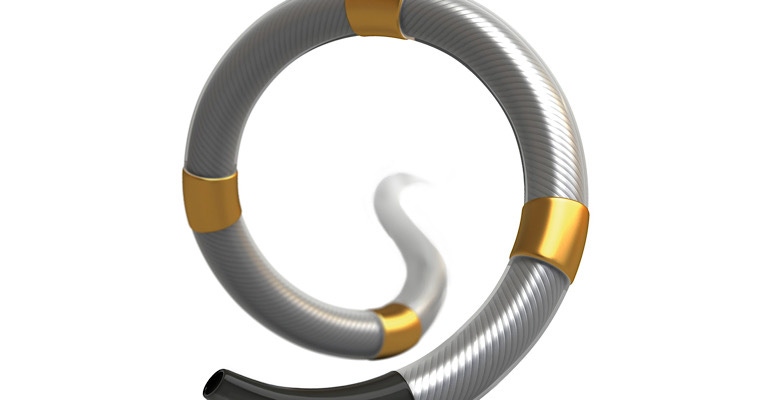Medtronic Finally Wins the Big One for Symplicity RDN Treatment
After trying for nearly a decade, the Dublin-based company has snagged approval for its device that treats patients living with hypertension.
November 20, 2023

Medtronic’s Symplicity Spyral renal denervation (RDN) system has been greenlit by FDA after the company has spent a decade vying for approval.
In a conversation with MD+DI on Monday, Jason Fontana, VP of marketing and strategy for Medtronic, said the company was moving fast to commercialize the device, which treats people living with uncontrolled high blood pressure.
“We plan to initiate commercialization very near-term,” Fontana told MD+DI. “We have our product supply and we have our teams ready to go. First and foremost, we recognize we’re bringing a procedure to hypertension. We want to continue to make sure that we do safe procedures, and we want to continue to make sure we build this market the right way and make sure patients are flowing in accordingly.”
The Symplicity blood pressure procedure is a minimally invasive procedure that delivers radiofrequency energy to nerves near the kidneys that can become overactive and contribute to high blood pressure. After sedation, the doctor inserts a single thin tube (known as a catheter) into the artery leading to the kidney. Once the tube is in place, the doctor administers energy to the system to calm the excessive activity of the nerves connected to the kidney. The tube is removed, leaving no implant behind.
The nod is a few months removed from an advisory committee voting against the technology. In August, BTIG analyst Ryan Zimmerman, broke down the panel’s vote.
Zimmerman wrote, “The panel voted on three main questions concerning the safety, efficacy, and risk/benefit profile of the Symplicity Spyral Renal Denervation System. Ultimately, the panel decided the data presented supports the safety with all 13 voting members of the panel voting yes. However, the efficacy and risk/benefit profile of the device is less clear. On the efficacy, seven members of the panel felt there is reasonable assurance that the Symplicity Spyral Renal Denervation System is effective for use in the patients who meet the criteria specified in the proposed indication.”
He added, “six members voted no due to a high degree of uncertainty and the failed HTN ON-MED trial. Similarly, the panel was split on the risk/benefit profile of the device as six members voted yes, six members voted no (seven including the panel chair), and one abstained from voting.”
The approval is a pivotal moment for Medtronic. Recall the firm obtained the technology through its 2011 acquisition of Ardian for $800 million. But when Medtronic’s hypertension study failed in 2014 many companies such as Boston Scientific and St. Jude Medical (before it was acquired by Abbott Laboratories) lost faith and left the space - signaling the worst for the market. Even Covidien, before it was acquired by Medtronic, backed out of its renal denervation program.
However, ReCor Medical persisted and was able to win a nod from FDA shortly before the agency greenlit Medtronic’s Symplicity. ReCor’s FDA nod could potentially benefit Medtronic.
“I think ultimately it helps to have more people in the space, which is good,” Fontana said. “I think competition is always good to have in the space and you want to make sure that you’re differentiating yourself and at the same time building this therapy out.”
The Path Forward through Reimbursement
Now Medtronic has approval it must turn its attention to reimbursement. In an August research note, Zimmerman speculated about what a reimbursement path would look like.
“ …Medtronic will likely need to work with payers to establish reimbursement, which we expect will be challenging given the modest clinical benefits demonstrated in clinical trials,” Zimmerman, wrote.
Fontana shed light on the Medtronic’s outlook regarding payors. He noted that 50% of hypertension patients fall into the CMS-care category and about 50% fall into the commercial payors care category.
“So, as we think about our [strategy] it’s really approaching Centers for Medicare & Medicaid Services and approaching commercial. I’ll take commercial first. That’s a one-by-one conversation. That initiates now. We can start to have those conversations now that we have approval and that becomes a one-by-one dynamic.”
He added, “On the CMS side, through the appropriate channels we have been in conversations there …I think in terms of if you were to [ask] if CMS requires an outcomes trial or something like that, I don’t think we’re going to be in that dynamic. There could be – as you move down the path for national coverage decisions and having the conversations with CMS - there could be some type of evidence that’s generated along the way. We don’t feel like there’s an evidence requirement for reimbursement.”
About the Author(s)
You May Also Like



.png?width=300&auto=webp&quality=80&disable=upscale)
